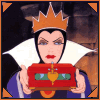
I don’t know how to write this post today, but I’m going to give it my best (uncensored) effort. You see, I recently came to the realization that my coping mechanism for dealing with the bullshit (-gates and puppies and conspiracy theories and what-have-you) was to shut down emotionally. I was bewildered by it, but at the end of the day the only thing I can control is the manuscript in front of me. That was my coping mechanism.
But it’s not always a good one. You see, as an artist in all things I do not believe that my purpose for being (or my work) is static. As I grow, the art does, too. In media/tie-in, I take an established world through the lens of multiple examinations; here’s what you fell in love with, and here’s something new to help you fall in love with it all over again. That “new” bit stems from deeper analysis about what worked and what didn’t, and often this means thinking critically to set aside the emotion, to rip a work apart, see what makes it tick, and put it back together again. I thrive off of critiques as opposed to reviews, and in recent years there’s been a surge in 140 character reactions and reviews based off of back cover copy, which drowns out necessary critical analysis that helps all of us see what we cannot from various perspectives. To improve, then, I either rely on my own observations or by taking a broad statement and seeing how it applies.
Critiques, reviews, and product reviews(1) are not the same thing, and it’s impossible for me to keep up with social media to ferret out the difference between the three. I have, mind you, lurked on public forums and whatnot to read what the general consensus is, but again that passes through a lens of scrutiny and not emotion. What I haven’t realized until very recently is that emotional reaction can be a type of review in some cases, but due to the way we reward extremes–especially online–I typically don’t pay attention to them. This means that I am missing valid judgments, because those emotional extremes are off-putting.
Let me back up for a second and share with you some conventional wisdom. Picture a bell curve. With the production of any work, there’s 10 percent who will love you no matter what, and 10 percent who will hate you no matter what, on both ends of that curve. What I want, is to see what the other eighty percent is thinking and feeling. I mistakenly assumed most of those people have been bullied into silence by both ends of the spectrum; the loud defenders of an author who can do no wrong vs. the vocal naysayers who can’t stand whatever this person does(2).
Here’s what I missed, though: some valuable opinions are being expressed, and they’ve gotten louder because in order to be heard, they need to amplify their voices, too. Otherwise, they get drowned out, and that means creators like myself who want to learn, who are listening and thinking and reading despite the constraints of the projects that I work on… Well, creators like myself suffer the most, I feel. Because all of the shouting blends into one major argument where no one is heard. Add in the fear–one that I very much feel–of death threats and doxxing and calls for being fired for having a differing opinion or a bad cover or what have you(3)… I shut down. I shut down those voices, I turn to something positive instead, and I continue making art and doing the best I can because that is all I can do. And, since I do not create art to prove anybody wrong, this taps into why I make art in the first place. My identity is not wrapped up in “a” release, it is tied to the long years of my life, and my desire to continually learn and grow and improve.
I don’t know what to do about this, because there is another side to this story. Folks on the outside of an argument, who don’t have anything to do with the -gates or puppies or what have you, now believe that an entire industry is toxic as a result. And that, my dear readers, is flatly not true. It’s not. But, this is the state of things today: a few assholes can, do, and have supported the illusion that they have negatively impacted The WorkTM of hundreds, if not thousands, of people. When, in reality, it is not the work that’s been affected, really, it’s the people. I have not talked to a single writer or artist or editor or what-have-you that has stopped making art because of the cultural shifts and toxicity that’s been spreading both online and off. I have, however, heard from several new folks who are avoiding certain industries because of those assholes, though, because they do not have the knowledge, experience, or patience to wade into a battlefield where none are perceived to be welcome(4).
I’ve said it before, but people often go where they feel welcome. And, sometimes this means going offline entirely, or shutting up about the assholes, or avoiding drama altogether. (Or in my case, saying that “YES, YOU ARE WELCOME!” when hiring or inviting people to things.) Sure, these are all coping mechanisms, but I see now that there is something else being lost as a result. There are good people fighting to be heard, to be recognized, to reach creators with their views and they are not quiet. They are loud simply because the volume is turned up on both ends, which means the folks that would normally be in that middle bit of that bell curve are also boosting their volume, too.
I don’t know what to think or do about this, because I feel (the space) is focused on calling out the assholes as “assholes”. Being positive is not rewarded in this era of yellow journalism, but being a bully or a smart-ass (typically male, mind you) most definitely is–and I fear what that is teaching the new generation of artists, what that is bringing out in all of us, and how “being loud” is now a metric. I would much rather eviscerate someone in iambic pentameter than spend energy online engaging in cyber wars, in part because there are many conversations I feel I should not be a part of(5) or I choose to walk away from because of the many time constraints I’m under(6).
Right now, there’s very little emphasis on the complex spectrum of emotions and behaviors that go hand-in-hand with being a healthy human being who happens to be a professional artist or what-have-you, and I have to wonder who will suffer the most in the end. Is it the fans who feel that they need to shout no matter what? Is it we the professionals, who feel it’s simultaneously risky to have strong opinions and expected of us? Is it the new writers who are now more scared than ever to enter into a mine field? Is the folks who have, thus far, remained silent because they feel they cannot speak up for fear of being bullied?
I just don’t know, for I realize that I have been one of those people bullied into silence(7). And I don’t know how to feel about that, either, but I do know and want to express one very important thing: for those of you who are upset, who are expressing yourself now because you feel you have no other option but to be louder than the bullies, I see you. I see you, I feel you, and I will do the best job that I can for you, and I hope together we can return to a place of joy and complex discussions as we take this journey together.
Thanks for listening.
(1) Like Amazon. Please, let us not forget that Amazon reviews are to benefit their customers on their store. Yes, they are a publisher, but they are a retailer first and foremost.
(2) I should mention, too, that it’s impossible for me to know who has actually read the thing folks are talking about in its entirety. If a work has not been published yet, I throw those opinions out because marketing does what marketing does, but if it has? Still challenging to know.
(3) The utter lack of the ability to resolve business-related conflicts in a way that doesn’t hurt or bully one side or the other is a consequence of this.
(4) I am certain there are some artists who have abandoned working in the industry, but if there are people who have given up on it entirely by no longer finding anybody to work with, then I am not aware of those folks.
(5) For example, the discussion about diversity in fiction. Do I believe in it? Yes. Do I feel comfortable being on the front lines talking about it? No, and I would much rather signal boost the many diverse voices of marginalized writers that are already doing that work. To put it bluntly: not every cause is about me, personally, and I recognize that. That is my choice.
(6) This ties back into the old adage that “time is money”. For me, this is true. I have to be very careful about how I spend my time, because if I were to get swept up into talking about books and games all the time, I wouldn’t actually write them. Marketing accounts for a fair bit of my time, but I earn the most value by focusing on writing and producing new stories.
(7) A very, very personal thing.
- Mood: Con Crud Day 3 (The Sniffles)
Caffeinated Beverages Consumed: Mostly managed out of necessity.
Work-Out Minutes Logged Yesterday: Laughable.
In My Ears: Captain Whinypants having a damage about something.
Game Last Played: Some sort of puzzle fiasco.
Book Last Read: Working on The Oracle: Ancient Delphi and the Science Behind its Lost Secrets and The Coldest Girl in Coldtown
Movie/TV Show Last Viewed: Star Wars: Empire Strikes Back
Latest Artistic Project: A bunch of earrings.
Latest Fiction/Comic Release: Gods, Memes, and Monsters and Firefly: The Gorramn Shiniest Language Guide and Dictionary in the ‘Verse.
Latest Game Release: Ghouls & Revenants for Vampire: The Masquerade.
Current State of Projects: Read my latest (woefully outdated) project update and My Departure from the Conan RPG.


